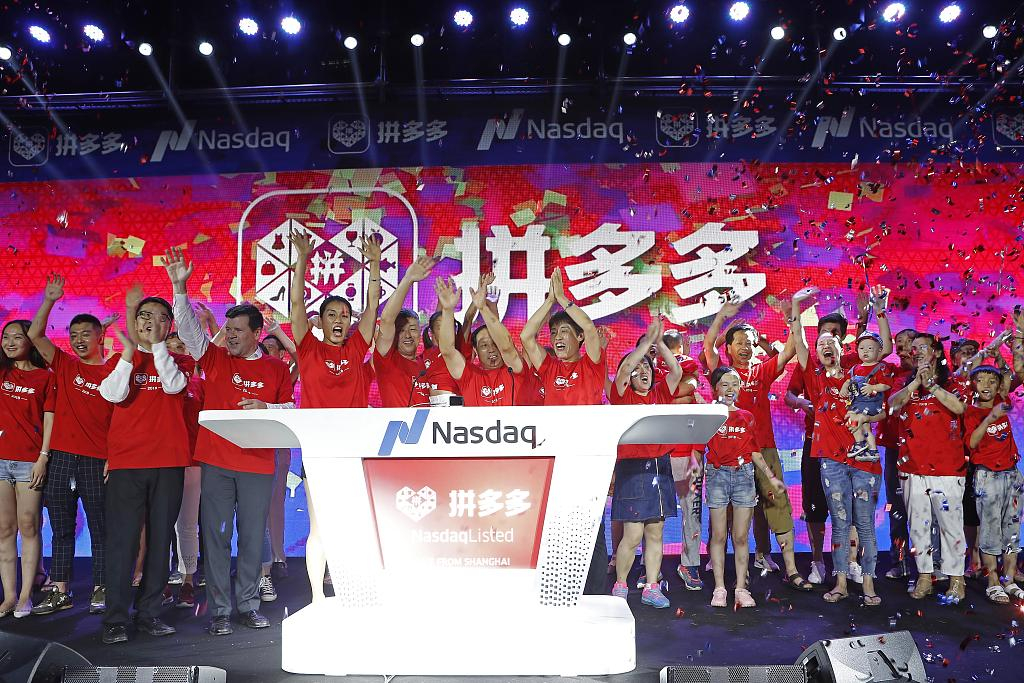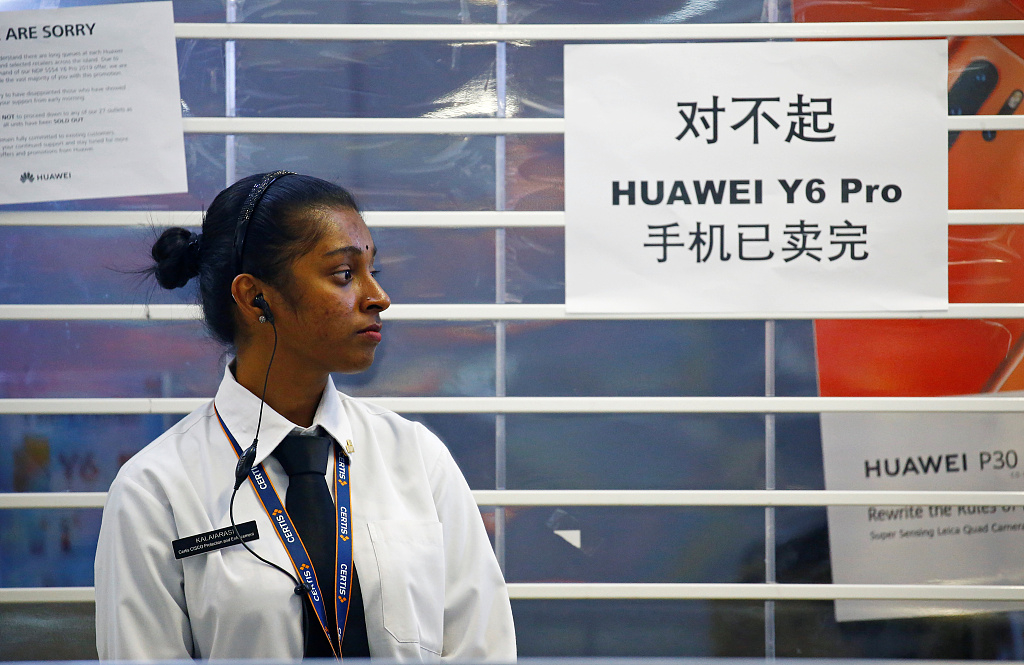For China's tech companies, to survive in the country's fiercely competitive landscape is getting increasingly difficult.
Look at e-commerce. Taobao dominated the field with more than half of the market, followed by Tencent-backed JD.com. Pinduoduo, a group-buying site that rose to prominence in recent years, managed to snatch a 5-percent market share. But for any new startup, to shake the dominance of the big three in the field is now virtually impossible.
"It was so hard these days to attract new users for internet companies in China," said Liu Zhaoning, CEO of Brive!, an international business consulting platform that helps Chinese companies to operate in international markets, in an interview with CGTN.
"There are only two options for Chinese tech companies: Go to lower-tier markets, or expand overseas," he added.

Pinduoduo employees gather in Shanghai to celebrate the company's Nasdaq debut, July 26, 2019. /VCG Photo
Pinduoduo employees gather in Shanghai to celebrate the company's Nasdaq debut, July 26, 2019. /VCG Photo
The strategy now for many Chinese tech giants to sustain their growth is to venture overseas. They are now setting their eyes on India and Southeast Asia. While some launch their products overseas and build up operations from scratch, many join the battlefield by investing directly in local startups.
Didi Chuxing, the giant ride-hailing service provider, is one of those companies. In 2015, Didi led an investment of an undisclosed sum in the Indian ridesharing company Ola. In 2017, it teamed up with Japan's Softback to invest a combined two billion U.S. dollars in the Singapore-based ride-hailing company Grab.
"Didi's influence is growing globally," said a senior executive at Didi's international strategy department who requested anonymity. "Southeast Asia is a market with huge potential, but it is hyper-competitive. Didi is making a big move by investing and forming strategic partnerships with local players."

Grab's CEO Anthony Tan speaks during Grab's fifth anniversary news conference in Singapore, June 6, 2017. /VCG Photo
Grab's CEO Anthony Tan speaks during Grab's fifth anniversary news conference in Singapore, June 6, 2017. /VCG Photo
Countries in Southeast Asia are drawing parallels to China a decade ago, at a time when the rapid rise in mobile phone ownership, large population base, and untapped consumption potential gave rise to the exponential growth of mobile-based businesses.
A less-than-mature tech culture in those emerging markets may be a blessing in disguise, said Liu Zhaoning, CEO of Brive!. For example, the lack of household savings and unfamiliarity with credit cards among people in India create the perfect conditions for the fast growth of Paytm, an Indian mobile payment company that has been invested in by Ant Financial.
Rather than looking for new business models, Chinese tech firms are mostly pursuing a safer approach – investing in local startups with a business model proven to be successful in China's homegrown market, Liu told CGTN. The strategy for Chinese venture capitals is more or less the same, investing in areas that are already mature in China, such as in e-commerce, financial technology and logistics.

Attendees try out Xiaomi Mi 4i smartphone during a launch event in New Delhi, India, April 23, 2015. /VCG Photo
Attendees try out Xiaomi Mi 4i smartphone during a launch event in New Delhi, India, April 23, 2015. /VCG Photo
This also means local tech companies can follow the Chinese playbook when competing at home. After a forming strategic partnership with Didi, Grab launched GrabHitch, a carpooling service similar to its Chinese partner's DidiHitch. It also rolled out mobile payment method Grabpay, taking inspiration from the ubiquity of mobile payment in China.
The key to translating domestic victory into international success is localization. "It is not easy to go global. Car service is all about people, yet people in different regions have different lifestyles," said the senior executive at Didi's international strategy department.
The myriads of culture and different stage of growth in India and Southeast Asia make localization particularly important. In Malaysia, no food delivery business can thrive if the startup does not take local halal customs into consideration. In India, where there are more than 20 official languages, tapping into the dialect-speaking market beyond the big cities promises more business potential.

A sign at a Huawei store, reading, "Sorry! Huawei Y6 Pro is sold out" during a National Day promotion in Singapore, July 26, 2019. /VCG Photo
A sign at a Huawei store, reading, "Sorry! Huawei Y6 Pro is sold out" during a National Day promotion in Singapore, July 26, 2019. /VCG Photo
As more Chinese companies make inroads to markets abroad, they are more prepared to make adjustments to local markets. Huawei, China's homegrown telecommunications giant, is one of the earliest Chinese tech companies to set up operations in Southeast Asia. Among its staff of 2,400 in Malaysia, 1,700 are local hires, according to Na Ying, a senior consultant at WPP Consulting, who has been advising Huawei on its Southeast Asian business.
The company has established 11 global shared services centers in the country, on top of retail stores, regional offices, labs, and research institutes to truly establish its root in the country, Na added.
But cross-cultural clashes still arise, despite companies' commitment to increasing local hires to address cultural gaps. "Sometimes Chinese staff are a bit domineering, which causes problems especially when management is all sent from Chinese headquarters," Vaani, who works at a consulting group in Kuala Lumpur dealing with Chinese tech companies, told CGTN.
As the competition in China's homegrown market gets fierce, going to India and Southeast Asia is becoming the inevitable next step for many Chinese tech companies. As Vaani said, to dig deep into the local market, Chinese companies are advised to "be local and then go global" – hire more local staff, use local branding and know the real needs of the local market – to build up long-term trust.